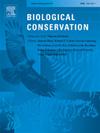青藏高原牧区适应性管理与社会学习促进了生态系统的恢复
IF 4.4
1区 环境科学与生态学
Q1 BIODIVERSITY CONSERVATION
引用次数: 0
摘要
适应性管理被认为是应对环境不确定性和促进生态系统恢复的可行方法。然而,以往关于适应性管理的研究往往忽视了当地社区的参与及其知识,导致这种方法的公平性和有效性降低。为深入认识地方群落参与适应性管理的价值,本研究以青藏高原牧区群落自组织适应性草地恢复为例进行了研究。基于对42个关键信息提供者的访谈,我们发现:1)当地社区在产生景观特定知识和理解选址的多维条件方面发挥着至关重要的作用,这是实现有效修复结果的必要条件;2)考虑景观文化方面的动员策略对于促进社区参与恢复活动至关重要;③可见的恢复成功、实际的实施和社会网络可以促进社区之间的社会学习,并促进新的适应;(4)在场地对场地的社会学习过程中,知识必须适应特定的当地景观。我们建议政府制定包容性的生态系统恢复项目,将当地社区的参与和他们的背景知识结合起来,以提高恢复效率,支持实现更广泛的恢复目标。在整个过程中,应注意景观的文化方面以及对用户友好的工具和机械的共同设计。本文章由计算机程序翻译,如有差异,请以英文原文为准。
Adaptive management and social learning of pastoral communities enhance ecosystem restoration on the Qinghai-Tibetan Plateau
Adaptive management is recognized as a viable approach to coping with environmental uncertainties and enhancing ecosystem restoration. However, previous research on adaptive management has often overlooked the involvement of local communities and their knowledge, leading to diminished equity and effectiveness of this approach. To deepen insight into the value of engaging local communities in adaptive management, we conducted a case study on self-organized adaptive grassland restoration by pastoral communities on the Qinghai-Tibetan Plateau. Based on 42 key-informant interviews, we found that: 1) local communities play a vital role in producing landscape-specific knowledge and understanding the multi-dimensional conditions for site selection, which are essential for achieving effective restoration outcomes; 2) a mobilization strategy that considers the cultural aspects of the landscape is crucial for facilitating community participation in restoration activities; 3) visible restoration success, practical implementation, and social network can promote social learning between communities and fostering novel adaptations; 4) knowledge must be adapted to the specific local landscape during the site-to-site social learning process. We recommend that governments develop inclusive ecosystem restoration projects that incorporate the participation of local communities and their contextual knowledge to enhance restoration effectiveness and support the achievement of broader restoration goals. Attention should be given to the cultural aspects of the landscape and to the co-design of user-friendly tools and machinery throughout this process.
求助全文
通过发布文献求助,成功后即可免费获取论文全文。
去求助
来源期刊

Biological Conservation
环境科学-环境科学
CiteScore
10.20
自引率
3.40%
发文量
295
审稿时长
61 days
期刊介绍:
Biological Conservation is an international leading journal in the discipline of conservation biology. The journal publishes articles spanning a diverse range of fields that contribute to the biological, sociological, and economic dimensions of conservation and natural resource management. The primary aim of Biological Conservation is the publication of high-quality papers that advance the science and practice of conservation, or which demonstrate the application of conservation principles for natural resource management and policy. Therefore it will be of interest to a broad international readership.
 求助内容:
求助内容: 应助结果提醒方式:
应助结果提醒方式:


